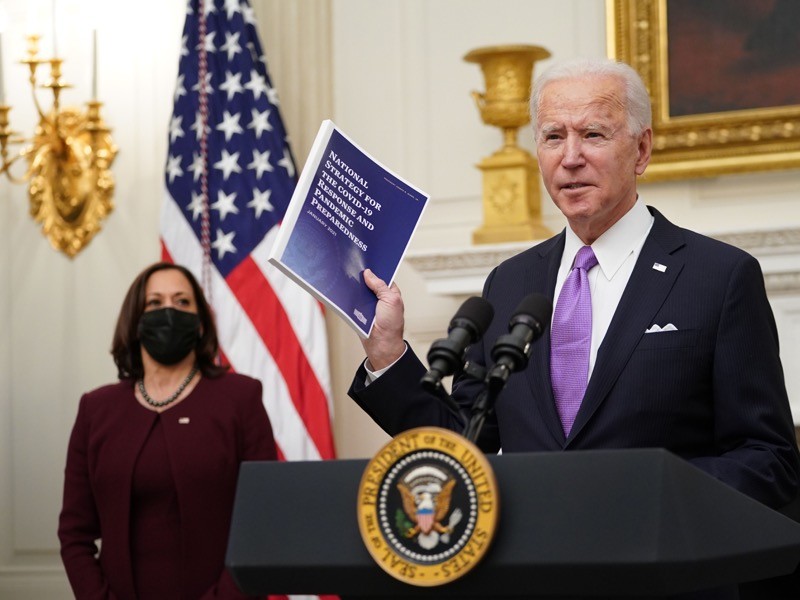Smarter testing, faster vaccinations and health equity are cornerstones of the 200-page COVID-19 strategy released by US President Joe Biden’s administration on 21 January, as the country surpassed 420,000 deaths due to the coronavirus. The plan pledges to “listen to science” — a shift from the approach of former president Donald Trump, who, at times, politicized scientific evidence and ignored public health recommendations.
Many researchers posted messages on Twitter expressing relief that scientific evidence would play a central role in Biden’s plan. They also celebrated the existence of a coordinated national pandemic strategy, complaining that Trump’s failure to enact one impaired testing, tracing and other responses required to tame the outbreak.
“This marks a pretty radical shift,” says J. Stephen Morrison, director of global health policy at the Center for Strategic and International Studies in Washington DC, who compares Biden’s strategy to a wartime national mobilization.
The speedy posting of a federal plan bodes well, says Janet Hamilton, the executive director of the Council of State and Territorial Epidemiologists, based in Atlanta, Georgia. “We are really pleased to see the release of a national strategy to ensure we have a coordinated path forward,” she says.
Still, scientists who’ve long been working on the US coronavirus response, say that Biden’s strategy needs more detail, particularly on the funding, staffing and procedures for some initiatives, such as the plan for scaling up surveillance of new variants of the coronavirus, SARS-CoV-2.
More testing and better data
The Biden plan aims to ensure that all Americans can be tested regularly for coronavirus infection by increasing the number of testing sites, and by scaling up the production of rapid tests. Helen Chu, an infectious disease researcher at the University of Washington in Seattle, says more testing will help, but it won’t be enough if the tests don’t reach communities hit hardest by the virus. She says the US government must figure out how to expand home testing for people who can’t get to testing sites because of work, childcare duties or a lack of transportation.
Increasing the United States’ surveillance for new, potentially dangerous, variants of SARS-CoV-2 is also part of the Biden administration’s plan. But Chu wants to see a systematic strategy for sequencing the genomes of coronaviruses across the country, as opposed to researchers conducting studies on samples they happen to obtain through fragmented projects. “Right now, surveillance is being led by academic research labs in a piecemeal way,” she says, “and not at the coordinated high-throughput level that you need to identify and act on new variants quickly.”
Biden’s strategy also calls for a better online dashboard for tracking the prevalence of the virus in cities and towns across the United States, so that people and officials can make evidence-based decisions about socializing, or opening offices and schools. His plan also pledges to enhance data analysis at hospitals and health departments, and to modernize data systems used within the US healthcare system, which are often painfully outdated.
Hamilton is pleased with that goal, but cautions that it won’t be realized until funding is in place. “We need a serious investment in resources to build data superhighways,” she says.
She and Chu are also concerned that simply having more data, and even regular press briefings from the US Centers for Disease Control and Prevention — another part of Biden’s plan — won’t overcome the ocean of misinformation surrounding COVID-19. People who want evidence-based answers about the reliability of tests, vaccine safety and other questions struggle to find them online, says Hamilton. “We really need to tackle how to provide really plain information to the public.”
Turbocharging vaccination efforts
Chasing an ambitious goal of administering 100 million shots to US residents in its first 100 days in office, the Biden team proposes 100 new vaccination centers run by the federal government, mobile vaccination units in underserved areas, and using grocery stores and stadiums as vaccination venues. The ramp-up includes growing the ranks of vaccinators with retired or foreign-trained doctors, as well as medical students, and by directing federal staff like nurses, physician assistants and doctors at various federal agencies to assist US states.
This multitude of new players will need clear instructions, says Saad Omer, a vaccinologist who is director of the Yale Institute for Global Health in New Haven, Connecticut. For instance, at the start of the US vaccine rollout, most vaccination centers did not receive guidance on how to allocate unused doses leftover at the end of the day, a predictable development because it’s known that people who make vaccination appointments don’t always keep them, he says. Now some states are beginning to provide those instructions.
There will also be unanticipated hitches unique to a location — and health officials should be prepared to respond to those, too. “Immunization programs sink or swim based on local ‘microplanning,’ ” says Omer.
An inclusive plan
Biden has established a COVID-19 Health Equity Task Force to ensure an “equitable pandemic response”. In the United States, COVID-19 has killed 2.8 times as many Hispanic and Black people, and 2.6 times as many Native American people, as white, non-Hispanic people.
It’s critical that this task force work in sync with the entire federal response team, and have a clear sense of their goals, says Jewel Mullen, associate dean for health equity at Dell Medical School at the University of Texas at Austin. “Equity needs to inform every aspect of the operation.”
And Biden’s plan seems “on target” to do this, she says. For instance, separate from the task force, the strategy lists ways to get vaccines and information to high-risk groups and communities of colour. It also states an intent to back “equitable reopening” of colleges, noting that students from low-income families were more likely in the past year to cancel plans to attend college.
But moving the needle on healthcare access in the United States will take time, Rachel Hardeman, a reproductive health equity researcher at the School of Public Health at the University of Minnesota in Minneapolis, wrote to Nature in an e-mail. “COVID-19 has exacerbated and highlighted inequities and systemic racism in our systems that has been there in some way, shape or form for 400 years,” she says. "COVID response and relief must be a starting point for building new systems and structures that lead with equity."
Rejoining the global fight
Last July, Trump began withdrawing from the World Health Organization (WHO), after he accused it of ignoring reports of the virus spreading in China. Soon after, 750 global health experts wrote a letter to US Congress saying the accusations were unfounded and that the “withdrawal will likely cost lives.”
Biden’s COVID-19 strategy states that the United States will rejoin, fund and help reform the WHO so that it’s more equipped to respond to health emergencies in the future. The plan also states that the United States will join the WHO’s COVAX initiative, which aims to provide vaccines around the globe, and will support its research and development programme, the ACT Accelerator. And Biden will attempt to prevent future pandemics by launching a National Center for Epidemic Forecasting and Outbreak Analytics.
Morrison, a global health policy director, says that joining the WHO and COVAX is a “terribly important step,” but he notes a long path ahead in getting vaccines to low- and middle-income countries. “How much of a priority will that be when we have cascading crises domestically — the US pandemic, the economic crisis, racial strife and a grave proportion of Americans who don’t believe that Biden won the election?”
"What" - Google News
January 27, 2021 at 03:27AM
https://ift.tt/36d64xW
Biden's ambitious COVID plan: what scientists think - Nature.com
"What" - Google News
https://ift.tt/3aVokM1
https://ift.tt/2Wij67R
Bagikan Berita Ini
















0 Response to "Biden's ambitious COVID plan: what scientists think - Nature.com"
Post a Comment